|
|
|
Sort Order |
|
|
|
Items / Page
|
|
|
|
|
|
|
| Srl | Item |
| 1 |
ID:
109946
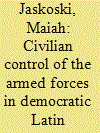

|
|
|
|
|
| Publication |
2012.
|
| Summary/Abstract |
This article presents a new framework for measuring civilian control of the armed forces in post-transition Latin America. Specifically, it builds on approaches that focus on military privileges and military protest, particularly in the face of government challenges to those privileges. Adding mission performance as a third dimension both helps us measure civilian control more accurately and provides causal leverage, as the three dimensions can interact. The paper demonstrates the utility of the framework through a close-up analysis of a critical case: civil-military relations in Peru since the 1990s.
|
|
|
|
|
|
|
|
|
|
|
|
|
|
|
|
| 2 |
ID:
109950
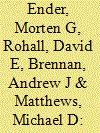

|
|
|
|
|
| Publication |
2012.
|
| Summary/Abstract |
The authors investigate a gap in attitudes toward homosexuals in the U.S. military among a select group of people-American civilian undergraduates, Reserve Officer Training Corp (ROTC) cadets, and cadets at military academies. Using a subsample (N = 3057) of data from the Biannual Attitude Survey of Students (BASS), being a military academy cadet is associated with the strongest agreement for barring homosexuals from serving in the military, followed by ROTC cadets and civilians. These trends continue when controlling for respondents' sex and political affiliation-the two most significant predictors of agreeing to bar homosexuals from military service. A small reduction in agreement for barring was found among academy cadets over time.
|
|
|
|
|
|
|
|
|
|
|
|
|
|
|
|
| 3 |
ID:
109944
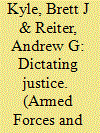

|
|
|
|
|
| Publication |
2012.
|
| Summary/Abstract |
Militaries throughout the world operate their own courts to prosecute military crimes, such as insubordination, that are not part of civilian legal codes. Latin American militaries traditionally have extended this hermetic justice system to cover all crimes committed by their personnel, allowing the institution to sit in judgment of its own actions and escape punishment for human rights violations. This parallel legal system erodes the principle of equality before the law, threatens civilian control of the military, and nurtures a culture of impunity. This article develops a theoretical model to explain the state of military court jurisdiction over military personnel for human rights violations in democracies. It then empirically tests this model on seventeen cases in Latin America. The article concludes that the variation in reform of military courts is a result of the relative balance between the extent of military autonomy and the strength of the civilian reform movement.
|
|
|
|
|
|
|
|
|
|
|
|
|
|
|
|
| 4 |
ID:
109948
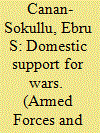

|
|
|
|
|
| Publication |
2012.
|
| Summary/Abstract |
This study examines the differences recorded in transatlantic relations from the viewpoint of mass public opinion in the United States of America, Germany, France, and the United Kingdom concerning military engagements in the post-Cold War era, namely the Kosovo (1999), Afghanistan (2001), and Iraqi (2003) wars. Theoretically, this study builds upon the analysis of the "domestic support for wars" from three mainstream theories of public opinion concerning the use of force; namely, the "principal policy objectives," "ends and means calculus," and the "leadership effect." It also offers a multidimensional approach by introducing a number of variables such as risk, halo effect, multilateral participation, legitimacy, escalation, and self-defence concerning wars. Taking a comprehensive view of the existing polling data on public opinion (1998-2004) an aggregate analytical method is devised and a quantitative analysis of the aggregate polling data is employed to map out correlations between trends in warfare and trends in domestic support for wars.
|
|
|
|
|
|
|
|
|
|
|
|
|
|
|
|
| 5 |
ID:
109947
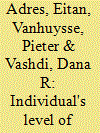

|
|
|
|
|
| Publication |
2012.
|
| Summary/Abstract |
The article inquires about the role of globalization on individual commitment to the state by studying the tendency of high school students to evade obligatory military service in Israel. We define five dimensions of the individual's level of globalism (ILG) and examine their impact on degrees of military service commitment. We suggest a new nondichotomous approach by considering, in addition to full evasion and full commitment to combat service, the option of quasi-evasion: to serve, but in a risk-free role. Investigating a sample of 2,705 eleventh and twelfth grade students, we find that quasi-evasion is widespread, involving 54 percent of all respondents and 40 percent of all males. More "globalized" individuals, those lacking active local ties and those with high levels of consumerism show a significantly greater tendency to evade military service. Counter to our expectations, students with lower levels of individualism also show a significantly greater tendency to evade military service.
|
|
|
|
|
|
|
|
|
|
|
|
|
|
|
|
| 6 |
ID:
109949


|
|
|
|
|
| Publication |
2012.
|
| Summary/Abstract |
The aim of this article is to analyze the advantages that the Americans have derived from the Chieu Hoi program operated during the Vietnam War. By this to indicate the relevance of military history research on present-day realities, especially in Afghanistan and Iraq. According to this claim, the Vietnam War should be considered as one of the most important formative periods in the field of warfare against revolutionary forces in general and in American military history in particular. Through a discussion of the Chieu Hoi program, the article will attempt to achieve two aims. The first aim is to analyze the historical significance of the program within the general framework of the American COIN programs during the course of the Vietnam War. It should be noted that there is still no comprehensive research on this program, and a secondary aim of this historical analysis will be to try and fill in this gap. The second aim of the article will be to find the relevant operative implications that can suggest the feasible utilization of this type of program in contemporary conflicts.
|
|
|
|
|
|
|
|
|
|
|
|
|
|
|
|
| 7 |
ID:
109945


|
|
|
|
|
| Publication |
2012.
|
| Summary/Abstract |
Little attention has been paid to the factual contribution of the state's security forces to the physical security of African citizens. Reports about security forces adding to a widespread insecurity are frequent: the protectors become violators, and their appearance causes fear, not security. In many African crisis countries the realization of better security forces appears to be an elusive goal, either because violent conflicts are not definitively settled and therefore do not allow for decent reform or because a lack of capacity as a result of material constraints is not easy to remedy. Above all, the political will of governments to reform their security forces, including their composition and structure, is often limited. This contribution compares the security provision by official forces in Liberia and the Central African Republic, two extreme cases of strong and weak international involvement, respectively, in postconflict security-sector reform. Blueprint models for such reforms that do not take into account local expectations and experiences are bound to fail.
|
|
|
|
|
|
|
|
|
|
|
|
|
|
|
|
| 8 |
ID:
109943


|
|
|
|
|
| Publication |
2012.
|
| Summary/Abstract |
The impact of military service on the status attainment of World War II veterans has been studied since the 1950s; however, the research has failed to come to any consensus with regard to their level of attainment. Analyses have focused on cross-sectional or longitudinal data without considering the effects of service over the life course. The authors argue that World War II veterans, regardless of race, have greater attainment, measured in terms of education, income, and occupational prestige, over their lifetimes than nonveterans. They use census data from the 1950 through 2000 Public Use Microdata Sample. The authors find that military service afforded white veterans significant advantages through their early and middle working years; however, their nonveteran peers eventually caught up. They also find that black veterans receive more of a social status advantage relative to black nonveterans, and military service helps to close the socioeconomic gap between blacks and whites.
|
|
|
|
|
|
|
|
|
|
|
|
|
|
|
|
|
|
|
|
|